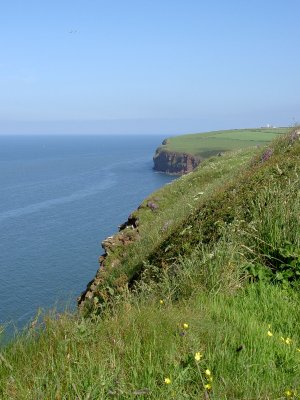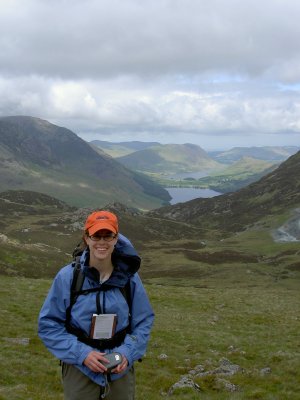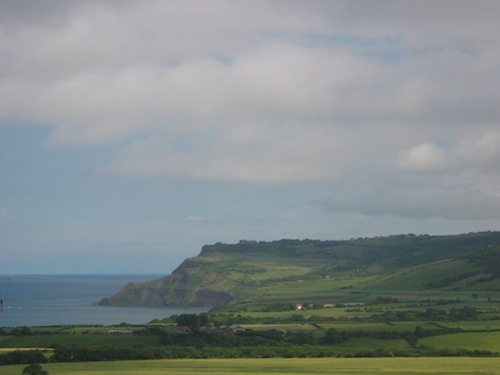 Photo: Kathryn ApplegateWainwright's Coast to Coast is a 190-mile trek across northern England: it begins at St. Bees on the Irish Sea, traverses the Lake District, the Yorkshire Dales, and the North Yorkshire Moors, and finally concludes at Robin Hood's Bay's undramatic concrete boat launch on the North Sea. I joined three other women for this walk one summer, and we completed it in two weeks — about average, allowing for three rest days but requiring several days with 20+ miles (assuming you don't take unnecessary detours on the shorter days). The landscapes we saw during those two weeks will remain unparalleled in our memories: we lugged our full packs and walking sticks across steely grey mountains, past countless nettles, across narrow dew-sodden fields, up and down heathery moors. When we stepped outside the Black Sail hostel for tea, when we made the knee-aching descent into Grasmere, when we washed our feet in the stream just outside Glaisdale, we always stared slack-jawed at the scenery: "No one sees this without walking five miles into nowhere," we often said.
Photo: Kathryn ApplegateWainwright's Coast to Coast is a 190-mile trek across northern England: it begins at St. Bees on the Irish Sea, traverses the Lake District, the Yorkshire Dales, and the North Yorkshire Moors, and finally concludes at Robin Hood's Bay's undramatic concrete boat launch on the North Sea. I joined three other women for this walk one summer, and we completed it in two weeks — about average, allowing for three rest days but requiring several days with 20+ miles (assuming you don't take unnecessary detours on the shorter days). The landscapes we saw during those two weeks will remain unparalleled in our memories: we lugged our full packs and walking sticks across steely grey mountains, past countless nettles, across narrow dew-sodden fields, up and down heathery moors. When we stepped outside the Black Sail hostel for tea, when we made the knee-aching descent into Grasmere, when we washed our feet in the stream just outside Glaisdale, we always stared slack-jawed at the scenery: "No one sees this without walking five miles into nowhere," we often said.
The four of us experienced that landscape at different paces, however: Katie (the smallest and fastest) generally took the lead, I (the oldest and slowest) generally brought up the rear, and Ashley and Kathryn occupied the middle, sometimes walking together and sometimes separating to either slow down and join me or speed up and join Katie. The paths rarely accommodated more than two people side-by-side. Occasionally we walked alone or together in complete silence, but we often traded walking partners in order to trade conversations. The few times Katie and I walked together, we theorized about movies; Kathryn and I usually discussed theology; and Ashley and I took on the most varied conversations.
On one of the early days whose finale seemed particularly hard, Ashley and I were trudging along rather slowly behind the others and we were trying to take our minds off our aching bodies. "Tell me a story," she said. I began to rehash some stories my Grandma Esther had told me about mid-century life in Comanche, Texas, and we found ourselves sufficiently preoccupied from our own fleshly pains to complete the day's miles. The trick caught on, and all of us soon began at least one such conversation every day: "Tell me a story. About anything. Just tell me a story."
The learning curve was steep. We learned about all the things friends generally learn gradually and accidentally, as your stories naturally intertwine. C.S. Lewis says these sorts of details are bothersome to real friendships, for friends really want to get at the philosophical business and avoid all the mundane as much as possible. They want to help when a friend's father finds himself in the hospital but hope he gets well soon — not so much to alleviate the suffering the friend feels at the illness but so that they can quit talking about it and instead talk about the ideas that established the friendship and have comprised it ever since. The real tragedy of the father's hospitalization, then, is not that he may die but that the situation has eclipsed the conversation of friends.
But when one's father is fine, or at least you presume so since you hardly have called back home since immersing yourself in the clouds and nettles and heath, and all that sets before you is a grand landscape that calls you to love, then you walk alongside your friend and discuss that father and where he came from and how he read to you as a child and concocted bedtime stories just for you and taught you the perfect softball throw. And you barter such stories for her lessons in poetic meter, for the story of her engagement, for her small remembrances of budding Bartlett pears where young violinists shoved their hot bodies between lessons and, after, made the whole hall smell the sickest sweet.
Then you walk alone a while and think of what she said. You think that hers was a glorious childhood with hardly any trouble. You covet all that you could not affirm as also your own. You want to steal her story because it sounds right and yours feels wrong.
You think of questions to ask her the next day and do not hurry to ask them, for you indeed seem to have limitless hours on limitless days. The phrase "before I forget" does not exist here. It is impossible to imagine the trip home where the phrase will return to your vernacular. You are home here.
This cycle seemed infinitely repeatable, the primary business of walking punctuated only by circumstantial shifts: lone meditation at first, pace changes to find a partner mid-morning, chat about the earlier meditations, have a story, stop for lunch. The afternoon had a similar liturgy, accompanying our walk through the creation narrative with our own created narratives.
We learned after a few days how to keep moving and enjoy the scene at the same time, how to discern which pictures we needed to take and which we could do without, and how to tell stories from home while enjoying alien country. But why did we feel the need amid all that natural beauty to request personal anecdotes or stories about family members back home? Were we merely searching for distraction from blisters, muscle aches, and wheezing lungs?
 Photo: Kathryn Applegate
Photo: Kathryn Applegate
No, this impulse my fellow walkers had on our path was not just a desire for diversion; it cropped up in other ways, too. I have never seen women so hungry for reading material as these: though they had all brought books with them, they made quick work of them and shipped them home early to lighten their packs. I maintained my small library brought from home, unable to return any of the slim volumes: C.S. Lewis's The Problem of Pain, T.S. Eliot's Four Quartets, and a Bible. Nightly readings about pain served a salve to my aching muscles, and I often reiterated the high points for the others while walking the next day. Eliot seemed more a talisman, with phrases to set my affections rightly in the adopted home and ward off phantasmic fairies. The latter standard we often considered, Kathryn and I together memorizing the start of Psalm 40 as we set out from Keld, mist occluding our eyes.
When halfway through the walk we finally arrived at a hostel with a library, my companions pored over the shelves and selected a volume of fairy tales for the four of us to read aloud together that evening. The next day, when the local bookstore finally opened, they spent a good hour considering additional weight in their packs versus sufficient reading material for the remaining days. One of them decided two books would do: Charlotte Brontë's tome Villette and, on my recommendation, Alice McDermott's Child of My Heart. A few days later, when we happened upon a used book sale, they bought who knows how many old hardbacks.
Perhaps these voracious readers are not the usual sort one meets on the street, or even a cross-country walk. However, it seems that the natural impulse we four had to desire stories more than news, e-mail, or calls home says something about human beings: indeed, we were made for community and story. The vastness of an awe-inspiring landscape can simultaneously humble us and stir us to transcendent thoughts, but it cannot call us into fellowship with itself (despite the Romantic philosophies) and tell us where we came from or for what purpose. Only community and story do that, for groups define themselves by the stories that they share, that they need to define their existence and purpose. All our lesser narratives thus point human beings toward the communion they were designed to have with God Himself.
So we human beings create communal narrative in various ways. The four of us walking across England told each other about what we were like before any of us met, what we had read the day before, what we had learned over the past decade of schooling, what conversation we had enjoyed with a fellow walker at yesterday's hostel. All those lesser stories are just intimations of what human beings are supposed to do: tell the narrative of how and why they came to be.
We humans should do more walking. We do not set our extreme venial pumps in motion often enough, finding sighs and groans easier than inclines of any slope. But a walk like the Coast to Coast constantly reminds those who submit to it that we do not own this place; in fact, we are more likely to find the creation swallowing us than we are to conquer any acre of it. While we walk it, we tell our stories so that we can marvel that any two of us ever came to the same path, ever discovered a narrative where both of us play as characters among the grouse nests that the heather hides so well.

Jennifer Strange is the assistant editor of the Art House America Blog. Also a wife, mother, teacher, writer. Look for her poems in The Southern Poetry Anthology, Volume IV: Louisiana available any day now by Texas Review Press. And/or come hear her read Friday night at The Yellow House of Highland.














